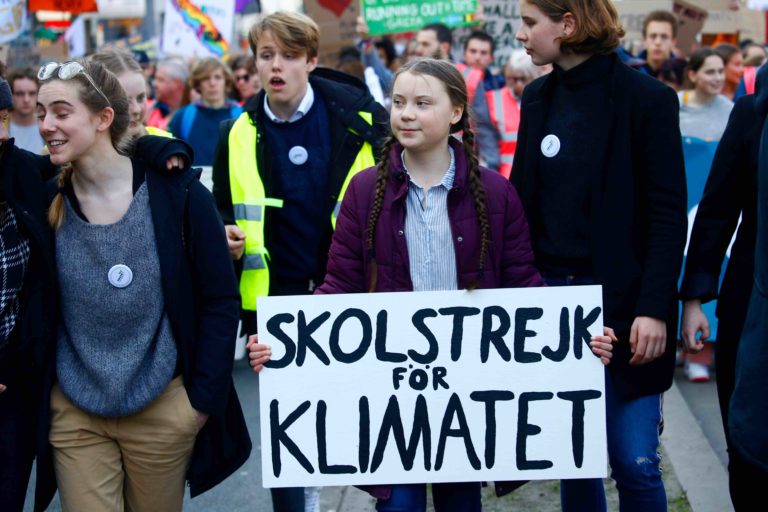Back from a week across the pond for a speech applying gray rhino theory to climate change at a risk conference in Brussels organized by the Flemish government, I’ve been considering whether we are at a tipping point that can speed progress in pulling our planet back from the brink.
The number and intensity of warnings seems to be increasing, in the form of high-profile reports and an increase in protests from both student and general citizen protests.
After Brussels, I spent a few days in the UK, where the Extinction Rebellion “XR” protests not only snarled London traffic but ultimately succeeded in getting the UK to become the first country to declare a climate emergency.
A recent Yale University study found that six in ten Americans now say that they are either ‘alarmed’ or ‘concerned’ about global warming.” Of those, nearly seven in ten (68%) believed that corporations should do more to address global warming; more than six in ten wanted Congress (62%) and their fellow citizens (65%) to do more.
The United States even has a US presidential candidate, Jay Inslee, running on a climate change-focused platform, and the beginnings of a conversation of what a Green New Deal for the US economy might look like.
David Wallace Wells, author of the best-selling book, Uninhabitable Earth, suggests that the most recent Intergovernmental Panel on Climate Change report, released in October 2018, offered “a new form of permission” to the world’s scientists. “The thing that was new was the message: It is O.K., finally, to freak out. Even reasonable,” Wallace Wells wrote.
The science coming from the private sector and economic policy makers backs that up.
A group of 415 investors controlling $32 billion in assets recently issued a very specific warning: that a 4 degree rise in temperature could result in $23 trillion in losses over 80 years.
A new BlackRock Investment Institute report rang the alarm bells: “Our early findings suggest investors must rethink their assessment of vulnerabilities,” the document warned. “Weather events such as hurricanes and wildfires are underpriced in financial assets, including US utility equities. A rising share of municipal bond issuance is set to come from regions facing climate-related economic losses. And many high-risk commercial properties are outside official flood zones.” BlackRock estimated that a “No climate action” scenario will hurt 58% of US municipalities by 1% or more of GDP over 2060-2080.
A recent San Francisco Federal Reserve study warns that climate change could play a role in triggering a financial crisis. The pain points are many: “potential loan losses at banks resulting from the business interruptions and bankruptcies caused by storms, droughts, wildfires, and other extreme events…[and]transition risks associated with the adjustment to a low-carbon economy, such as the unexpected losses in the value of assets or companies that depend on fossil fuels.” These could have ripple effects even on firms with limited carbon emissions through, say, bad loans to climate-affected businesses or mortgages on coastal real estate. “If such exposures were broadly correlated across regions or industries, the resulting climate-based risk could threaten the stability of the financial system as a whole and be of macroprudential concern,” the report concluded.
The Carbon Disclosure Project reports that water-related problems caused $38.5 billion in businesses losses in 2018: not theoretical projections, but actual losses.
German reinsurer Munich Re estimates that 2018 was the fourth costliest year worldwide to date for uninsured losses from extreme weather events, at £160bn.
Case in point: California’s Pacific Gas and Electric filed for bankruptcy this January, citing wildfire-related lawsuits and liabilities that could reach $30 billion.
Alas, it’s not yet clear that this increased sense of urgency will be enough to spark effective action. But it should.
Here’s the deal. The numbers are becoming clearer and clearer on the consequences if the climate change skeptics are wrong. On the other hand, if the people ringing the alarm bells on climate change are wrong, would we really be worse off with less polluted air, less waste, and more efficiency?
This article is part of my new weekly LinkedIn series, “Around My Mind” – a regular walk through the ideas, events, people, and places that kick my synapses into action, sparking sometimes surprising or counter-intuitive connections.
To subscribe to “Around My Mind” and get notifications of new posts, click the blue button on the top right hand on this page. Please don’t be shy about sharing, leaving comments or dropping me a private note with your own reactions.
- The Gray Rhino Wrangler on Substack - January 1, 2025
- Gray Rhino Risks and Responses to Watch in 2024 - January 10, 2024
- In the Media 2023 - December 31, 2023


